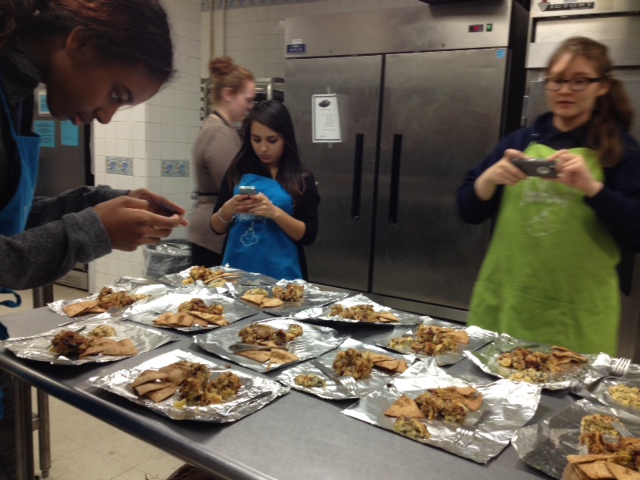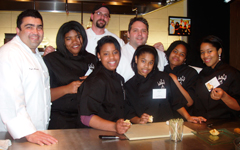Finding Our Way In the Midst of Mistakes

 Adding salt instead of sugar. Mincing an onion that was supposed to be sliced. Grabbing the baking powder when the recipe calls for baking soda. After a few months teaching at Brainfood, instructors have seen all manner of kitchen mistakes. While there are many ways to navigate kitchen errors, I thought I’d share two approaches that instructors can use to garner immediate results.
Adding salt instead of sugar. Mincing an onion that was supposed to be sliced. Grabbing the baking powder when the recipe calls for baking soda. After a few months teaching at Brainfood, instructors have seen all manner of kitchen mistakes. While there are many ways to navigate kitchen errors, I thought I’d share two approaches that instructors can use to garner immediate results.
One: Develop a spidey sense precog superpower that helps you prevent cooking errors before they happen. Next: learn to levitate. Then hover above the kitchen, swooping in a millisecond before you sense a critical error coming on. Watch triumphantly as failure and disappointment slip right out the door, rebuffed like a pair of fried eggs succumbing to the non-stick power of your helicopter parent pan. Get exhausted, then frustrated. Repeat until you realize that this was never a sustainable solution in the first place.
Two: First, assess the seriousness of a mistake before responding. Work on a good poker face and a calm, soothing voice that conveys confidence. Practice saying things like “That wasn’t an essential step.” and “It’s ok. This is a good time to brainstorm some other options.” Make sure to strip away any condescension from your voice when you do this, because it’s not your job to judge, it’s your job to rally morale. Ask students to come up with a few ways to resolve the solution, and listen to what they suggest like your job depends on it. If the only thing left to do is start over, be there to make that moment less lonely. Even better: tell your students about the strengths and skills they already have that make this setback a temporary one.
That “warm and welcoming environment” that we talk about creating at Brainfood? That’s a product of the second approach. When consistently employed, it allows trust to take root and thrive. Trust that we’ll try to work with (literally) whatever you bring to the table. Trust that this is a place to learn, to make mistakes, to grow beyond them – we say it, but more importantly, we promise to live it each day in class.
This is why, last week, on the day that our students were making pumpkin cupcakes to donate for Thanksgiving, we also chose to take time to talk about another mistake, one that has eclipsed so many communities and lives so quickly.
When you ask a teenager about Mike Brown, many answers start with adults. “My mom was watching the news all day…” “My uncle said if that happened to me…” It’s a reminder of how teens still look to adults for cues on what’s happening in the world, even as they develop their own lens for interpreting life. In our class, it wasn’t too long before sharing a parent’s opinion or view gave way to more strident statements. It’s crazy. I don’t understand. It’s too dangerous to take chances like that, when you’re black. Standing around our kitchen worktables, students grappled with all the big questions, the big issues that were too encompassing to be kept at bay outside the kitchen doors.
In moments like this, it’s tempting to reach for a word or a phrase to try to restore that sense of rightness. It's natural to look for a way to tell a different story, one that lessens the consequences of a horrific mistake, one that feebly mitigates all the daily injustices large and small that led to that moment. As a youth worker, your greatest fear is not that your students will make mistakes – that’s a given. The worst thing is the possibility of unjust punishment, the kind that festers in broken systems, cutting youth voice out of the conversation and robbing them of their chances at redemption.
I hope this small memory of a Brainfood class when our angry voices melded together and our questions stayed unanswered, sticks with our students. As a teacher, you can never really predict what your students will remember, but if they do think about this day, I hope they remember that in the 45 minutes of discussion, we didn’t try to gloss things over. We encouraged them to ask questions, learn more, be angry, and take action in a way that was honest and meaningful.
We can’t protect our students from the unjustness of the world, from the mistakes that are yet to be made, but we can help prepare them to fight for the world they deserve. It’ll be a fight, because it always has been, but in this moment, we stand with youth advocates who do this work every day, and we make a collective promise to the young people we serve: we are here to arm you with yourselves, and you are more than enough.







Comments
Post new comment